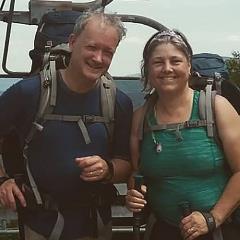Meet Tim Sargent, Software Fellow at Progress

As part of a yearlong celebration of our 40th anniversary, Progress would like to introduce you to some of our fantastic longtime employees who have made us who we are today. In this post, meet Tim Sargent, software fellow.
Tim is one of many longtime “boomerang” employees who at one point left the company, but then came back. After starting at Progress in October of 1987, he worked full-time  until September of 1997. Then he worked part-time while studying for his master’s degree, and left the company in 1999 to focus on his studies. He came back part-time in 2001 and came back full-time in January 2018.
until September of 1997. Then he worked part-time while studying for his master’s degree, and left the company in 1999 to focus on his studies. He came back part-time in 2001 and came back full-time in January 2018.
Progress gave him the flexibility to pursue other interests and education, but the connections he made here have spanned more than 30 years.
A 1983 graduate of the University of Vermont, where he studied computer science and math, Tim has been married for 35 years and has three adult children. He loves playing adult recreation league hockey and outdoors activities such as backpacking, skiing and hiking. He’s also active in his local church.
Here’s more of Tim’s story and his time at Progress, in his words:
How has Progress changed during your tenure?
It’s grown, for one. There were only around 40-50 people when I started and only 12 in product development. But I’d say that culturally, it hasn’t changed much. There’s always .tmb-medium.jpg?Culture=en&sfvrsn=b8bf3411_1) been this great pride in our work and real devotion to our customers—the premise has been their success is our success.
been this great pride in our work and real devotion to our customers—the premise has been their success is our success.
What I have seen change, relatively recently, say, in the past four years, is in our leadership. The direction and decisions seem to be a little more grounded in market realities and devoted to more rigorous business analysis. It takes a lot more than good technology to be successful and I think we’re getting better at cross-functional integration and communication.
Who has taught you the most at Progress?
I’ve learned lots from a lot of different people; standouts were founders Mary Szekely and Clyde Kessel, especially in the early years. But also architect Gus Bjorklund and colleague Pete Sliwkowski.
Pete joined a year after I did, and we shared an office and worked on a number of things together. He was a very colorful and driven personality. He was famous for his sayings, one of which I still live by: “We were too stupid to know that what we were doing couldn’t be done, so we went ahead and did it.”
What's your favorite memory at Progress?
Favorite? Wow. Very hard to say, but one comes to mind. Gus Bjorklund was always very encouraging. Eight or nine years ago I did some research and a prototype on an approach to multi-threading one of our products, the OpenEdge Application Server. Gus was keenly interested in this work and so when I had my first performance test results, I shared them with him. I had expected a multi-threaded process to be more efficient than the equivalent number of single-threaded processes doing the same work.
I was wrong and disappointed that there was no improvement, but Gus was not. He considered the project a success if it achieved parity, because OS’s were now much better at managing threads and processes. Gus was excited about the administrative and management possibilities the work promised. Later, whenever new problems with the project surfaced, Gus would assure me, “Yeah, but we’ll figure these out.” He was very encouraging.
What makes Progress a great company and why has it stood the test of time?
Great people working together to make great products that make a positive difference in the world. There are a lot of really smart people out there, but there are also a lot of really smart people right here who like to make a lasting difference.
But I think part of the reason it has stood the test of time has been an attitude, inculcated early on, that we’re in it for the long haul. Clyde Kessel embodied this. I remember in the very early ’90s we were all working very hard on a massive and disruptive project to transform our platform from a character mode only UI to a graphical UI. Another one of the young engineering managers complained in a staff meeting that people who were working longer hours should be compensated more.
Mind you, everyone was working very hard and long. But Clyde, who was directing engineering at the time, had an immediate and healthy response. He said something like, “If they can’t do their job in a reasonable amount of time, maybe they’re taking on more than they should; maybe we shouldn’t be encouraging that.” As one of the founders, Clyde knew how to work hard, but he also had the wisdom to know the dangers of things like burn-out.
What was the most ‘only at Progress’ moment that you've experienced?
I don’t know whether it’s “only at Progress,” but every time I attend one of our user’s conferences, I feel like I’m in the middle of some love-fest. It’s really quite remarkable. Our customers are very smart and they let us know what they’re struggling with, but they’re also very appreciative.
How has your life changed over your time here?
Technically, the world has changed: the explosion of the internet, the emergence of big data, virtualization everywhere, etc. There’s no shortage of interesting work. Personally, I went to grad school for a master’s of divinity and pastored a small church in central Vermont for 15 years. I’m grateful to have been able to do that while remaining at Progress part-time and remote during that time. Now I’m back full-time and enjoying the interesting work before us.
To get to know other Progressers like Tim, read more of our Progress employee interviews here.

